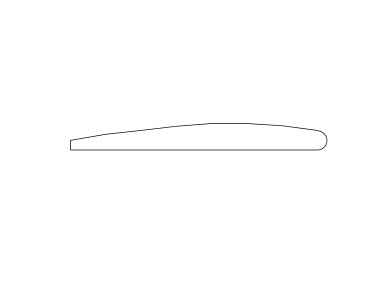I recall burning three or four weeks of a sabbatical getting Saccade.com on the air with Wordpress. So much tweaking…
Ponderings on the Armin Wing…
Ed over at the Experimental Airlines Youtube channel has a nifty way of constructing wings for RC airplanes out of cheap Dollar Tree foamboard. Last night, I was feeling kind of brainless, so I decided to practice my arts and crafts by constructing another, this time using a piece of 3/16″ dowel to stiffen it. When I was done, I thought it might be nice to figure out how it really ranks as an airfoil. For that, I needed two things: some accurate measurements, and a program to do some simulation on the wing. I haven’t got as far as the second, but I took out my cheapy Harbor Freight calipers and took some measurements, and created the following scale drawing. I didn’t bother computing nice spline curves for the top surface, but the leading edge is pretty close. The back doesn’t use Ed’s nifty tapered tape edges: I just put a bevel on the base, and then glued the top down, so it’s basically the thickness of the 1 layer of foam board at the back. Anyway, here’s a PNG, if you click on it, you should get a 300dpi version which is lifesized.
I’ll try to get this into an airfoil simulator, and compare it to other simple wings (plates and KFM2 wings, hopefully) to see how it compares. I also want to get a precise weight for the wing, so I can figure out how the lift and weight compare).
Anyway, that’s what passes for arts and crafts at my house. Stay tuned.
Addendum: Josh and Josh over at flitetest have a nice video I hadn’t seen before on airfoils. It wasn’t super technical, but it did show an interesting KFm style stepped airfoil made from what appears to be the same Dollar Tree foam I was using. I had made one for my glider prototype that was a KFm2 airfoil (two layers, with the step at 50%), but they use one that appears to be more like a KFm3 airfoil, with the bottom and top layers created from just one piece, folded over a middle piece. What’s especially cool is that they used it to replace the conventional (and complicated) wing for one of their Cessna models, and it seemed to work great. I’ll have to try making one of those too.

Comment from Doug Weathers
Time 11/14/2012 at 11:08 pm
Are you using XFOIL? It works pretty well.
http://web.mit.edu/drela/Public/web/xfoil/